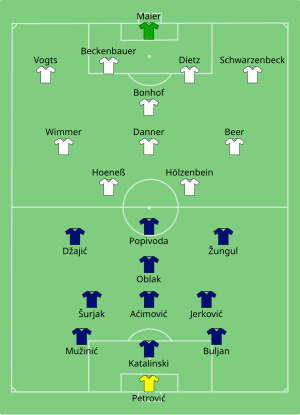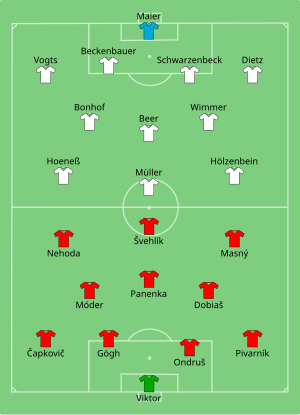
The 2000 UEFA European Football Championship, also known as Euro 2000, was the 11th UEFA European Championship, a football tournament held every four years and organised by UEFA, the sport's governing body in Europe.
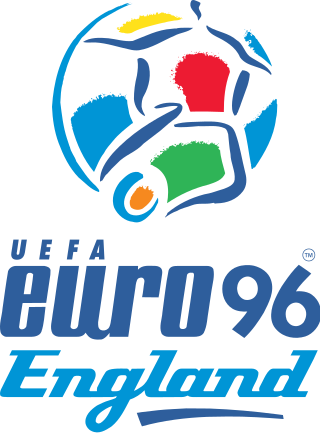
The 1996 UEFA European Football Championship, commonly referred to as Euro 96, was the 10th UEFA European Championship, a quadrennial football tournament contested by European nations and organised by UEFA. It took place in England from 8 to 30 June 1996. It was the first European Championship to feature 16 finalists, following UEFA's decision to expand the tournament from eight teams.

The 1992 UEFA European Football Championship was hosted by Sweden between 10 and 26 June 1992. It was the ninth UEFA European Championship, which is held every four years and supported by UEFA.

The 1988 UEFA European Football Championship final tournament was held in West Germany from 10 to 25 June 1988. It was the eighth UEFA European Championship, which is held every four years and supported by UEFA.

The 1984 UEFA European Football Championship final tournament was held in France from 12 to 27 June 1984. It was the seventh UEFA European Championship, a competition held every four years and endorsed by UEFA.
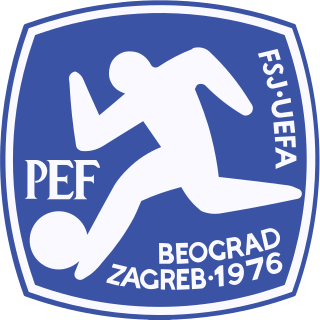
The 1976 UEFA European Football Championship final tournament was held in Yugoslavia. This was the fifth UEFA European Championship, held every four years and endorsed by UEFA. The final tournament took place between 16 and 20 June 1976.
The Croatian Football Super Cup is a football match between the winners of the Croatian national top league and football cup. The Super Cup is always held at the beginning of a new football season, and is only held when different clubs win the two most important competitions in the previous season.

The UEFA Euro 1976 Final was the final match of Euro 1976, the fifth edition of the European Championship, UEFA's top football competition for national teams. Contested by Czechoslovakia and West Germany, the match was played at Stadion Crvena Zvezda, Belgrade, Yugoslavia, on 20 June 1976. En route to the final, Czechoslovakia finished top of their qualifying group, which included England, Cyprus and Portugal. After beating the Soviet Union 4–2 on aggregate over a two-legged tie in the quarter-finals, they progressed to the final after defeating the Netherlands 3–1 after extra time in the semi-final. West Germany won their qualifying group, which included Greece, Malta and Bulgaria, before beating Spain 3–1 on aggregate in the two-legged quarter-final and tournament hosts Yugoslavia 4–2 after extra time in the single-match semi-final.
The UEFA European Championship is one of the major competitive international football tournaments, first played in 1960, whose finals stage has been held every four years. The Croatia national football team has contested this tournament since 1996, having been part of Yugoslavia up until the qualifying stages for the 1992 edition. Croatia has qualified for every Euro competition except for the 2000 edition, played in Belgium and the Netherlands. The team's best performances have been reaching the quarter-finals twice — in 1996 and 2008, losing to Germany and Turkey, respectively.
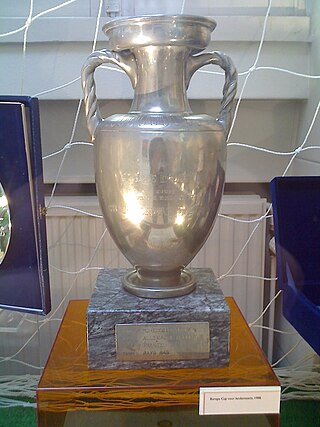
The Netherlands national football team has appeared in ten UEFA European Championship tournaments. They first participated in 1976, and won the title in 1988. With Belgium, the Netherlands co-hosted the 2000 tournament. The team did not enter the first tournament in 1960, and did not qualify in 1964, 1968, 1972, 1984, 2016.
The UEFA European Championship is the main football competition of the men's national football teams governed by UEFA. Held every four years since 1960, in the even-numbered year between FIFA World Cup tournaments, it was originally called the UEFA European Nations' Cup, changing to the current name in 1968.
As the Czech Republic is considered to be the successor team of Czechoslovakia by FIFA and UEFA, they have participated in ten UEFA European Championships; three of which were as Czechoslovakia and seven of which were as the Czech Republic. As Czechoslovakia, they became European champions in 1976. As Czech Republic, they qualified for every European Championship that they have played qualifiers for, and were runners-up at Euro 1996.
After the completed dissolution of Yugoslavia in 2006, the Serbia national team did not qualify for the four UEFA European Championships it played qualifiers for. Its official predecessor teams Yugoslavia and FR Yugoslavia/Serbia & Montenegro were more successful: the team representing "larger" Yugoslavia became European vice-champions twice while the union of Serbia and Montenegro reached the quarter-finals at Euro 2000.

The 2017 UEFA European Under-17 Championship was the 16th edition of the UEFA European Under-17 Championship, the annual international youth football championship organised by UEFA for the men's under-17 national teams of Europe. Croatia, which were selected by UEFA on 26 January 2015, hosted the tournament.
Group 3 of the UEFA Euro 1976 qualifying tournament was one of the eight groups to decide which teams would qualify for the UEFA Euro 1976 finals tournament. Group 3 consisted of four teams: Yugoslavia, Northern Ireland, Sweden, and Norway, where they played against each other home-and-away in a round-robin format. The group winners were Yugoslavia, who finished four points above Northern Ireland.
The knockout stage of UEFA Euro 1984 was a single-elimination tournament involving the four teams that qualified from the group stage of the tournament. There were two rounds of matches: a semi-final stage leading to the final to decide the champions. The knockout stage began with the semi-finals on 23 June and ended with the final on 27 June at the Parc des Princes in Paris. France won the tournament with a 2–0 victory over Spain.
The final tournament of UEFA Euro 1972 was a single-elimination tournament involving the four teams that qualified from the quarter-finals. There were two rounds of matches: a semi-final stage leading to the final to decide the champions. The final tournament began with the semi-finals on 14 June and ended with the final on 18 June at Heysel Stadium in Brussels. West Germany won the tournament with a 3–0 victory over the Soviet Union.
The UEFA Nations League is a biennial international football competition contested by the senior men's national teams of the member associations of UEFA, the sport's European governing body. The Croatia national football team contests this tournament in League A, with other major footballing nations. The team entered the Nations League's inaugural 2018–19 edition in League A, along with England and Spain in January 2018.
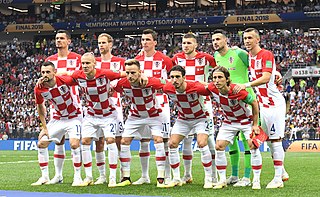
The Croatia–Serbia football rivalry is a football rivalry between the national football teams of Croatia and Serbia. It is considered to be one of the most hostile in world football due to their complex political history stemming from World War II and the breakup of Yugoslavia. The two rivals had previously both represented the Yugoslavia national football team, and contributed the bulk of the teams footballers during almost 70 years of its existence. Both national sides are governed by UEFA in Europe, in addition to FIFA during their international matches.
The 2019–20 UEFA Champions League qualifying phase and play-off round began on 25 June and ended on 28 August 2019.

